MercoPress. South Atlantic News Agency
Tag: José Mujica
-
Saturday, June 18th 2011 - 01:04 UTC
Uruguayan lawmakers mark the difference between “terrorism” and “armed insurgency”
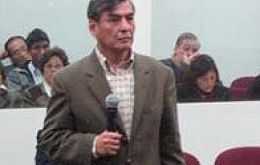
A group of Uruguayan lawmakers have written a letter to Peruvian president-elect Ollanta Humala requesting a more humane treatment for Victor Polay Campos, head of the guerrilla Tupac Amaru Revolutionary Movement, MRTA, jailed since 1992.
-
Friday, June 17th 2011 - 22:27 UTC
Uruguay president Mujica approval rating plunges 29 points in 15 months
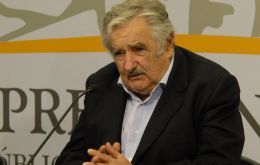
The approval of Uruguayan president Jose Mujica in Montevideo continues to slide and has plummeted eight points between February and May according to a Mori public opinion poll released this week.
-
Thursday, June 16th 2011 - 19:09 UTC
Uruguay supports Ban Ki-moon re-election because of his commitment to multilateralism
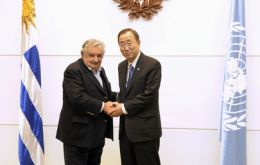
Uruguay’s support for the re-election of Mr Ban Ki-moon as Secretary General is based on his decisive efforts to impulse multilateralism since taking office in 2007, said Uruguayan Foreign Affairs minister Luis Almagro.
-
Tuesday, June 14th 2011 - 02:48 UTC
Peru’s Humala interested in joining “political” mechanisms of Mercosur
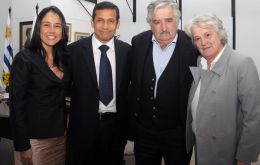
Peru is interested in regional integration, security, education, combating narcotics but full membership of Mercosur is “distant” said president elect Ollanta Humala during a one day visit to Uruguay, before leaving late Monday for Argentina.
-
Saturday, June 11th 2011 - 11:16 UTC
President Mujica claims attempts to weaken him government “so I have to leave”
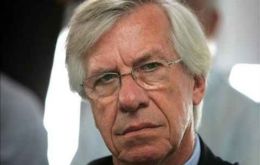
A controversy over land taxes inside the Uruguayan government exposed claims from President Jose Mujica that “meetings are taking place to debilitate his administration and even possibly remove him”
-
Friday, June 10th 2011 - 05:10 UTC
China and Uruguay sign 17 cooperation accords and 530m USD trade package
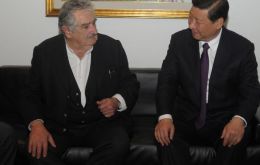
Visiting Chinese Vice-President Xi Jinping signed Wednesday in Uruguay 17 cooperation agreements and trade contracts for the purchase of 530 million US dollars in Uruguayan goods before leaving for Chile the third leg of his tour of Latin America.
-
Thursday, June 9th 2011 - 08:56 UTC
Uruguayan government divided over implementation of a new tax on farmland

The Uruguayan government is trying to decide how to implement a controversial new tax on land holdings involving approximately 60 million dollars per annum and which has exposed deep differences in the ruling coalition, is rejected by farmers and feared by investors.
-
Wednesday, June 8th 2011 - 16:36 UTC
Uruguay considers China a ‘strategic partner’ and supports a Beijing-Mercosur trade accord
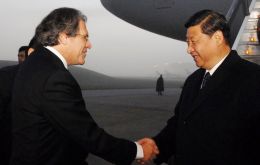
Uruguay sees China as a ‘strategic partner’ and has kept good relations with Beijing since the two countries forged diplomatic ties in 1988, said Uruguayan Foreign Affairs minister Luis Almagro, a former ambassador to China from 2007-2009. Almagro made the statement as Chinese Vice-President Xi Jinping begun his official visit to Uruguay.
-
Saturday, June 4th 2011 - 02:40 UTC
Hard times, even closure for some Uruguayan abattoirs, anticipated Mujica

Uruguayan president Jose Mujica warned that several abattoirs will run into deep trouble and might have to close down because of the lack of livestock ready for slaughtering. He also cautioned that “there is not much more the Executive can do”.
-
Thursday, June 2nd 2011 - 03:59 UTC
Uruguay rejects Zamin Ferrous mining project environment impact report

Uruguay made a long list of objections to the environment impact assessment study presented by the Aratiri mining project which plans open-pit extraction of magnetite (ferrous component) from vast resources in Valentines, the heart of the South American country.
